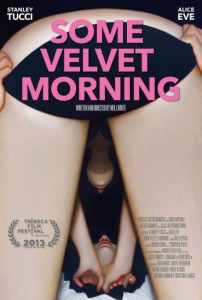Written and directed by Neil LaBute
USA, 2013
The new film Some Velvet Morning, writer-director Neil LaBute’s return to a cinematic appraisal of men and women in the modern age after nearly a decade away from the topic, is built on a deliberately slippery foundation. It is, in essence, a trick in the form of a one-location story with only two characters. Some films with twist endings demand to be watched multiple times; others, like this film, can only work one time, because a second or third or fourth viewing has no point. All Some Velvet Morning is about is its ending, in which LaBute appears to pull the rug out from the audience not to make a larger point about sex, gender, and violence, but because…well, because he can.
Stanley Tucci plays Fred, who shows up unannounced with a few pieces of luggage at the fancy New York brownstone of Velvet (Alice Eve). Fred has, he declares, just left his wife and is hoping to rekindle whatever spark he and Velvet once had. Within a few minutes, he finds out, to his shock, that she’s seeing other men, including his married son. There’s nothing more to the plot aside from the hint of something dark in their shared past. Some Velvet Morning only lasts 83 minutes (including the end credits, scored ironically to The Turtles’ “Happy Together”), and that time is spent watching Velvet try to calm Fred’s frustrated psyche so she can head out for a prior engagement, and then watching Fred attempt to bully his way into staying with her for ten more minutes, twenty more minutes, or even longer.
“Gotcha!” ending aside, the performances are solid, as one would expect with Tucci and Eve as the leads. The age difference is not only noticeable, but intentional, as LaBute explores the awkwardness arising from a man sleeping with a woman young enough to be his daughter. In this case, as it’s alluded to, Fred essentially got Velvet—who can’t stand that name, though we hear no other—to leave his son and stay with her, even as he remained a married man. Tucci, in particular, is extremely acidic and nasty as Fred, who can stand comfortably next to the aggro leads of LaBute’s other films like In the Company of Men and Your Friends and Neighbors. And LaBute, having worked extensively in live theater, is smart enough to let many of the scenes play out not only in real time, but with a minimum of cuts. Though it wasn’t written for the stage, it’s easy to imagine Some Velvet Morning being adapted as such. He utilizes the single setting for maximum impact, especially in the final ten minutes.
But those final ten minutes are a real problem; frankly, it’s difficult to discuss the movie in great detail without divulging the events that take place before the credits roll. Avoiding any spoilers, it’s safe to say that the last turn of the screw is a hollow attempt at being edgy and risky on LaBute’s part. Arguably, what that twist says about the lives of these characters invites one to ponder what these people’s lives are like outside of the brownstone. Once the other shoe drops, once we realize exactly what’s going on between Velvet and Fred (and certainly, with the knowledge that this film ends on a twist, you may very well guess what that twist is before LaBute reveals all), the whole setup is a pointless farce. If anything, these characters become vastly more interesting after the twist, which is exactly when the movie ends. Tucci and Eve are capable enough performers, but this movie badly needs to leave the confines of its interior setting and explore these people’s inner lives, not use them as props in a punchline to a nasty joke.
Considering that Some Velvet Morning is under 90 minutes and features Stanley Tucci onscreen for almost all of that time, it’s hard to say that this movie is a complete wash. (Tucci is quickly becoming one of those actors like Harry Dean Stanton or M. Emmet Walsh; the late Roger Ebert said that if either man was in a movie, that movie couldn’t be entirely bad.) He and Alice Eve are well-matched, but in the closing moments, Neil LaBute reveals that their match is simply a mean-spirited, unpleasant game. How men and women treat each other in the 21st century is a fine topic for a new film, but there’s so little in-depth exploration here. In the end, this film is like a shell game, a cinematic three-card Monte huckster who fools us long enough before we realize we’ve just lost a ton of cash.
— Josh Spiegel



